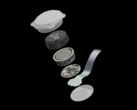Ubtech Robotics is currently best known for its industrial robots, used in manufacturing by major clients like BYD and Foxconn. These high-end models, priced at around $100,000, are still produced in limited quantities. In an interview with Bloomberg, Chief Brand Officer Michael Tam highlighted the growing demand in China for androids that can assist in domestic settings – a trend driven in part by the rising need for elderly care and a shortage of skilled workers. In response to this demand, Ubtech has announced plans to release a humanoid household robot later this year, aiming to make it accessible for private homes at an estimated price of $20,000.
Ubtech has not yet revealed a specific model name for its upcoming household robot. However, there are strong indications that the new device will build on the company’s existing Walker series. Featured on Ubtech’s website, these robots are humanoid in design, equipped with arms, legs and fine motorized grippers. Adapting this platform for domestic use would allow Ubtech to leverage an established technological foundation. A tailored version of the Walker line could be optimized for caregiving and assistance tasks without requiring entirely new development. For now, however, this remains speculative.
Exact role still unclear
The exact capabilities of Ubtech’s upcoming household robot have not yet been detailed. It is expected, however, to initially handle basic support tasks – such as fetching items, opening doors, delivering reminders or facilitating communication – particularly in elder care settings. More complex duties like cooking, cleaning or independently operating appliances are still seen as beyond current technological limits. Even Chief Brand Officer Michael Tam acknowledges that a fully versatile home robot will require several more years of development.
The competition begins
In China, robotics is receiving strong support from the highest levels of government. President Xi Jinping has designated the field a national priority, driving a surge in investment, research and real-world implementation. Ubtech aims to capitalize on this momentum, hoping to outpace rivals in bringing prototypes into practical use. However, the company is stepping into a crowded field: in just the past two years, hundreds of start-ups have entered the humanoid robotics space. At the same time, rapid advances in large language models are unlocking new possibilities for sophisticated robot intelligence.
By launching a household robot, Ubtech would also position itself in direct competition with Tesla and its Optimus robot, which is designed to handle a variety of domestic tasks and is expected to enter the consumer market at a price between $20,000 and $30,000. Tam views this international rivalry – particularly with the United States – as a source of constructive pressure. While the U.S. leads in developing cutting-edge AI algorithms, China holds an advantage in industrial deployment and large-scale manufacturing.





















